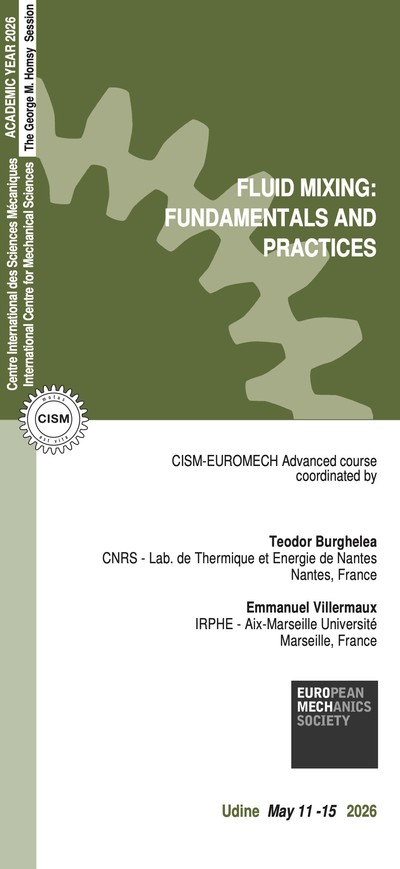M. Azaïez, M. Deville, E. H. Mund, Éléments finis pour les fluides incompressibles, PPUR Presses polytechniques (2011).
R. Mittal,G. Iaccarino, Immersed boundary method, Ann. Rev. Fluid Mech., 37, 239-261 (2005).
S. Pirozzoli, Numerical methods for high speed flows, Annual Rev. of Fluid Mechanics, 43, 163-194 (2011).
T. Poinsot, D. Veynante, Theoretical and Numerical Combustion, Third Edition, http://elearning.cerfacs.fr/ (2012).
T. K. Sengupta, High Accuracy Computing Methods: Fluid Flows and Wave Phenomena, Cambridge Univ. Press, USA (2013).
T. K. Sengupta, Instabilities of Flows and Transition to Turbulence, CRC Press, USA (2012).
P. G. Tucker, Advanced computational fluid and Aerodynamics, Cambridge Univ. Press, UK (2016).
6 lectures on: Proper Orthogonal Decomposition; Proper Generalized Decomposition and Singular Values Decomposition; Recursive Proper Orthogonal Decomposition; High Order Singular Values Decomposition; Example; High Reynolds number flow dynamics inside a singular lid driven cavity.
6 lectures on: Immersed Boundary Method; Governing equations; Discrete IB schemes; Geometry and Grid Generation; Fluid Flow Simulations; High Performance Computing; Domain decomposition approaches; MPI-based tools.
6 lectures on: Energy-preserving discretizations: FD methods for DNS of incompressible and compressible flows; Numerical issues in DNS and LES; Parallelization issues; Examples of DNS of wall-bounded flows.
6 lectures on: Introduction to combustion, Flame regimes; Turbulent flames; Detonations; Instabilities: Turbulent combustion models for arbitrary regimes; Which codes for combustion; RANS, DNS, LES; The impact of HPC on combustion codes: Modeling and simulations of combustion instabilities in gas turbines; Bifurcations in swirling flows.
6 lectures on:High Accuracy Computing; Spatial and temporal discretizations; Error dynamics and Dispersion relation preservation (DRP) Schemes; Global spectral analysis (GSA); Time Integration for DNS/ LES; Computing transitional and turbulent flows; Nonlinear receptivity and enstrophy transport equation for POD and ROM.
3 lectures on: Industrial hybrid-RANS LES modeling; Pre and post processing of LES; Advanced industrial simulation and LES.
* Italian VAT is 22%.





